The Role of Nursing Policy in Australian Aged Care Facilities
VerifiedAdded on 2022/08/21
|11
|2695
|13
Report
AI Summary
This report delves into the analysis of nursing policies within Australian aged care facilities, focusing on the Aged Care Act and its impact on nursing practice. It examines the role and responsibilities of nurses, highlighting their crucial contributions to patient care, medication management, and infection control. The report discusses key policies like the Aged Care Act of Australia, diversity and discrimination laws, and complementary frameworks. It explores the standards set by the Aged Care Quality and Safety Commission, the duties of nurses, and the importance of registered nurses in enhancing care quality. Furthermore, it addresses possibilities in the nursing profession, emphasizing organizational skills, emotional resilience, and the importance of cultural competence and ethical conduct. The analysis underscores the significance of nurses in maintaining high-quality care for elderly patients, ensuring their rights, and improving their quality of life, ultimately emphasizing the vital role of nurses within the aged care system.
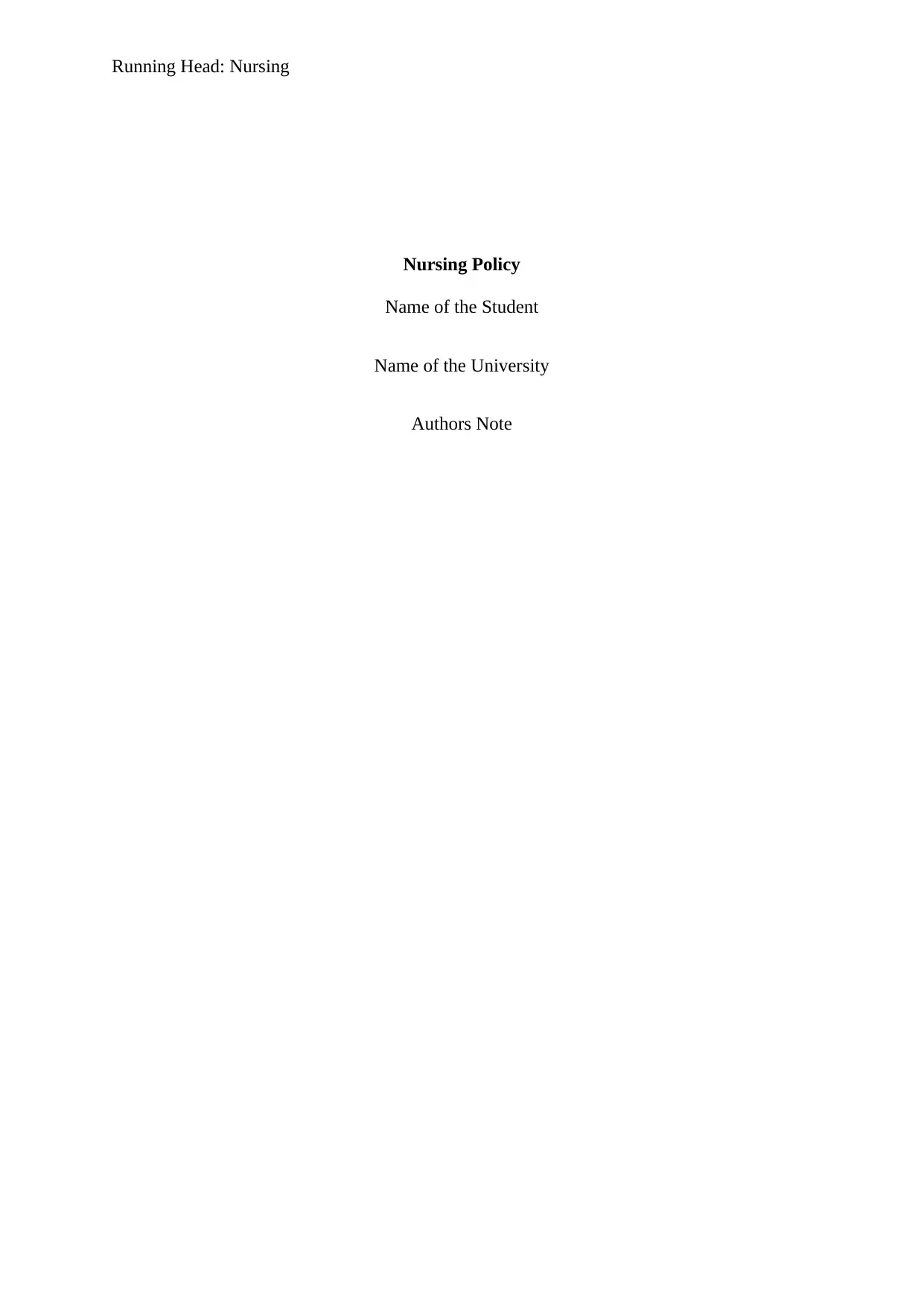
Running Head: Nursing
Nursing Policy
Name of the Student
Name of the University
Authors Note
Nursing Policy
Name of the Student
Name of the University
Authors Note
Paraphrase This Document
Need a fresh take? Get an instant paraphrase of this document with our AI Paraphraser
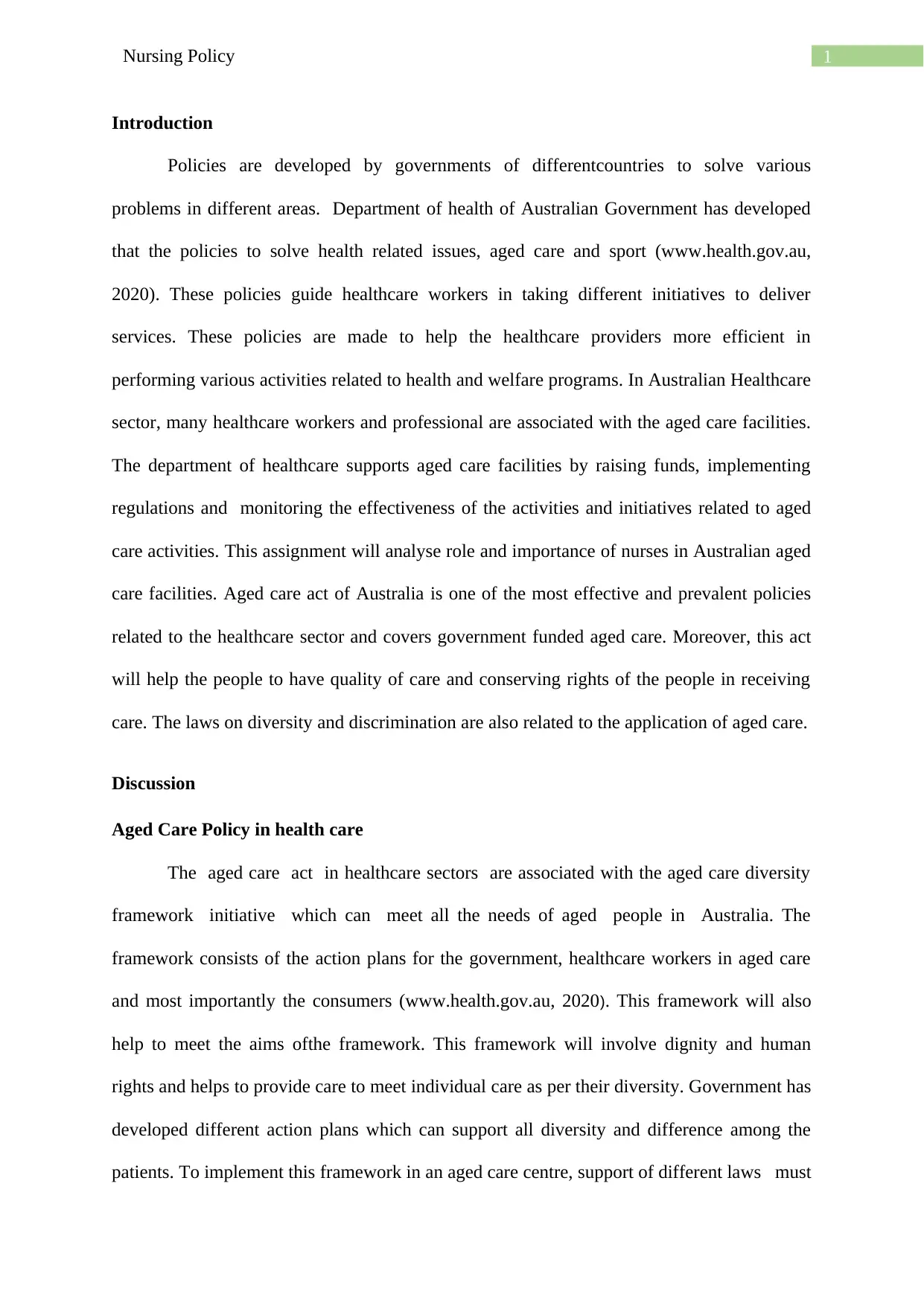
1Nursing Policy
Introduction
Policies are developed by governments of differentcountries to solve various
problems in different areas. Department of health of Australian Government has developed
that the policies to solve health related issues, aged care and sport (www.health.gov.au,
2020). These policies guide healthcare workers in taking different initiatives to deliver
services. These policies are made to help the healthcare providers more efficient in
performing various activities related to health and welfare programs. In Australian Healthcare
sector, many healthcare workers and professional are associated with the aged care facilities.
The department of healthcare supports aged care facilities by raising funds, implementing
regulations and monitoring the effectiveness of the activities and initiatives related to aged
care activities. This assignment will analyse role and importance of nurses in Australian aged
care facilities. Aged care act of Australia is one of the most effective and prevalent policies
related to the healthcare sector and covers government funded aged care. Moreover, this act
will help the people to have quality of care and conserving rights of the people in receiving
care. The laws on diversity and discrimination are also related to the application of aged care.
Discussion
Aged Care Policy in health care
The aged care act in healthcare sectors are associated with the aged care diversity
framework initiative which can meet all the needs of aged people in Australia. The
framework consists of the action plans for the government, healthcare workers in aged care
and most importantly the consumers (www.health.gov.au, 2020). This framework will also
help to meet the aims ofthe framework. This framework will involve dignity and human
rights and helps to provide care to meet individual care as per their diversity. Government has
developed different action plans which can support all diversity and difference among the
patients. To implement this framework in an aged care centre, support of different laws must
Introduction
Policies are developed by governments of differentcountries to solve various
problems in different areas. Department of health of Australian Government has developed
that the policies to solve health related issues, aged care and sport (www.health.gov.au,
2020). These policies guide healthcare workers in taking different initiatives to deliver
services. These policies are made to help the healthcare providers more efficient in
performing various activities related to health and welfare programs. In Australian Healthcare
sector, many healthcare workers and professional are associated with the aged care facilities.
The department of healthcare supports aged care facilities by raising funds, implementing
regulations and monitoring the effectiveness of the activities and initiatives related to aged
care activities. This assignment will analyse role and importance of nurses in Australian aged
care facilities. Aged care act of Australia is one of the most effective and prevalent policies
related to the healthcare sector and covers government funded aged care. Moreover, this act
will help the people to have quality of care and conserving rights of the people in receiving
care. The laws on diversity and discrimination are also related to the application of aged care.
Discussion
Aged Care Policy in health care
The aged care act in healthcare sectors are associated with the aged care diversity
framework initiative which can meet all the needs of aged people in Australia. The
framework consists of the action plans for the government, healthcare workers in aged care
and most importantly the consumers (www.health.gov.au, 2020). This framework will also
help to meet the aims ofthe framework. This framework will involve dignity and human
rights and helps to provide care to meet individual care as per their diversity. Government has
developed different action plans which can support all diversity and difference among the
patients. To implement this framework in an aged care centre, support of different laws must
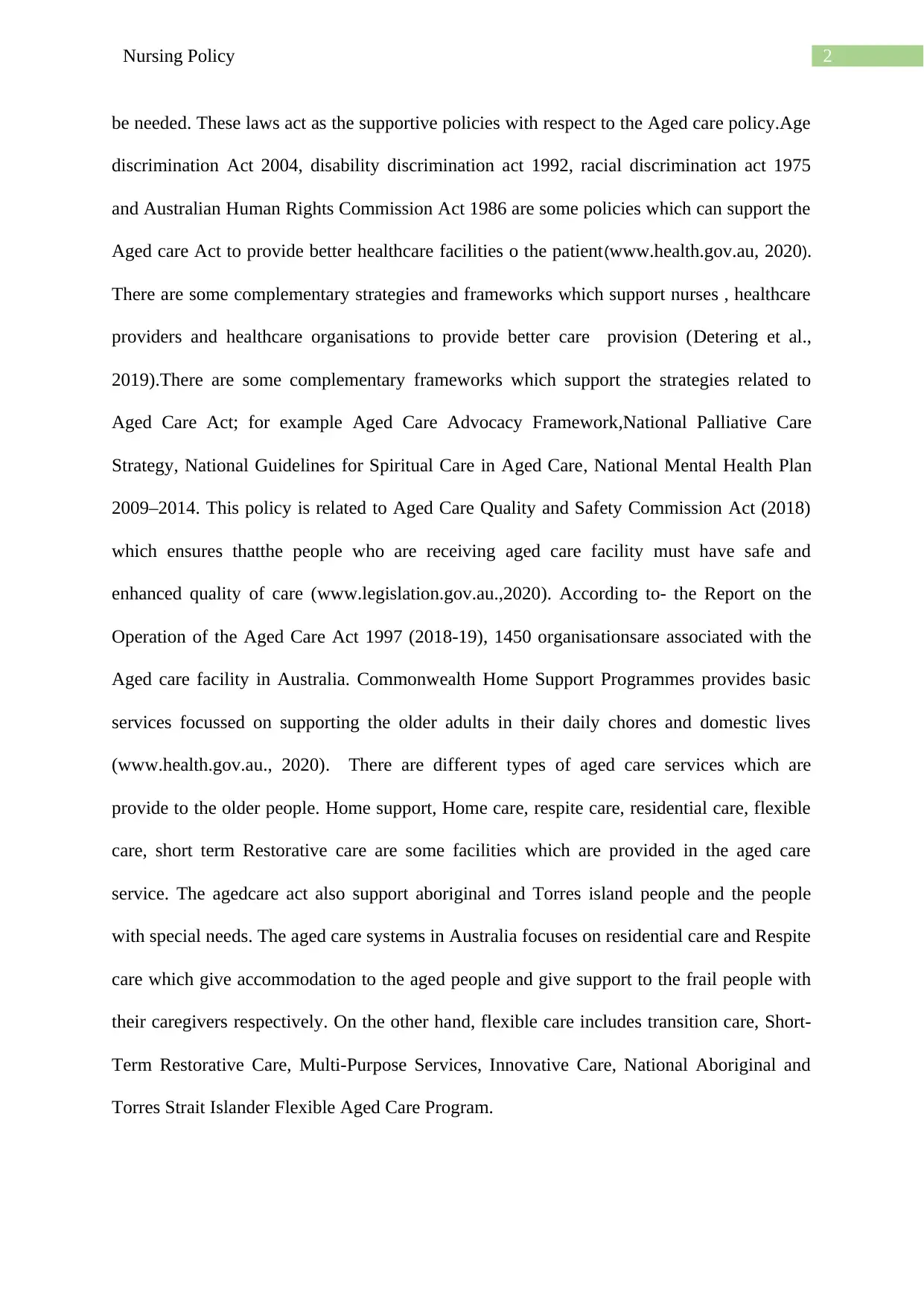
2Nursing Policy
be needed. These laws act as the supportive policies with respect to the Aged care policy.Age
discrimination Act 2004, disability discrimination act 1992, racial discrimination act 1975
and Australian Human Rights Commission Act 1986 are some policies which can support the
Aged care Act to provide better healthcare facilities o the patient(www.health.gov.au, 2020).
There are some complementary strategies and frameworks which support nurses , healthcare
providers and healthcare organisations to provide better care provision (Detering et al.,
2019).There are some complementary frameworks which support the strategies related to
Aged Care Act; for example Aged Care Advocacy Framework,National Palliative Care
Strategy, National Guidelines for Spiritual Care in Aged Care, National Mental Health Plan
2009–2014. This policy is related to Aged Care Quality and Safety Commission Act (2018)
which ensures thatthe people who are receiving aged care facility must have safe and
enhanced quality of care (www.legislation.gov.au.,2020). According to- the Report on the
Operation of the Aged Care Act 1997 (2018-19), 1450 organisationsare associated with the
Aged care facility in Australia. Commonwealth Home Support Programmes provides basic
services focussed on supporting the older adults in their daily chores and domestic lives
(www.health.gov.au., 2020). There are different types of aged care services which are
provide to the older people. Home support, Home care, respite care, residential care, flexible
care, short term Restorative care are some facilities which are provided in the aged care
service. The agedcare act also support aboriginal and Torres island people and the people
with special needs. The aged care systems in Australia focuses on residential care and Respite
care which give accommodation to the aged people and give support to the frail people with
their caregivers respectively. On the other hand, flexible care includes transition care, Short-
Term Restorative Care, Multi-Purpose Services, Innovative Care, National Aboriginal and
Torres Strait Islander Flexible Aged Care Program.
be needed. These laws act as the supportive policies with respect to the Aged care policy.Age
discrimination Act 2004, disability discrimination act 1992, racial discrimination act 1975
and Australian Human Rights Commission Act 1986 are some policies which can support the
Aged care Act to provide better healthcare facilities o the patient(www.health.gov.au, 2020).
There are some complementary strategies and frameworks which support nurses , healthcare
providers and healthcare organisations to provide better care provision (Detering et al.,
2019).There are some complementary frameworks which support the strategies related to
Aged Care Act; for example Aged Care Advocacy Framework,National Palliative Care
Strategy, National Guidelines for Spiritual Care in Aged Care, National Mental Health Plan
2009–2014. This policy is related to Aged Care Quality and Safety Commission Act (2018)
which ensures thatthe people who are receiving aged care facility must have safe and
enhanced quality of care (www.legislation.gov.au.,2020). According to- the Report on the
Operation of the Aged Care Act 1997 (2018-19), 1450 organisationsare associated with the
Aged care facility in Australia. Commonwealth Home Support Programmes provides basic
services focussed on supporting the older adults in their daily chores and domestic lives
(www.health.gov.au., 2020). There are different types of aged care services which are
provide to the older people. Home support, Home care, respite care, residential care, flexible
care, short term Restorative care are some facilities which are provided in the aged care
service. The agedcare act also support aboriginal and Torres island people and the people
with special needs. The aged care systems in Australia focuses on residential care and Respite
care which give accommodation to the aged people and give support to the frail people with
their caregivers respectively. On the other hand, flexible care includes transition care, Short-
Term Restorative Care, Multi-Purpose Services, Innovative Care, National Aboriginal and
Torres Strait Islander Flexible Aged Care Program.
⊘ This is a preview!⊘
Do you want full access?
Subscribe today to unlock all pages.

Trusted by 1+ million students worldwide
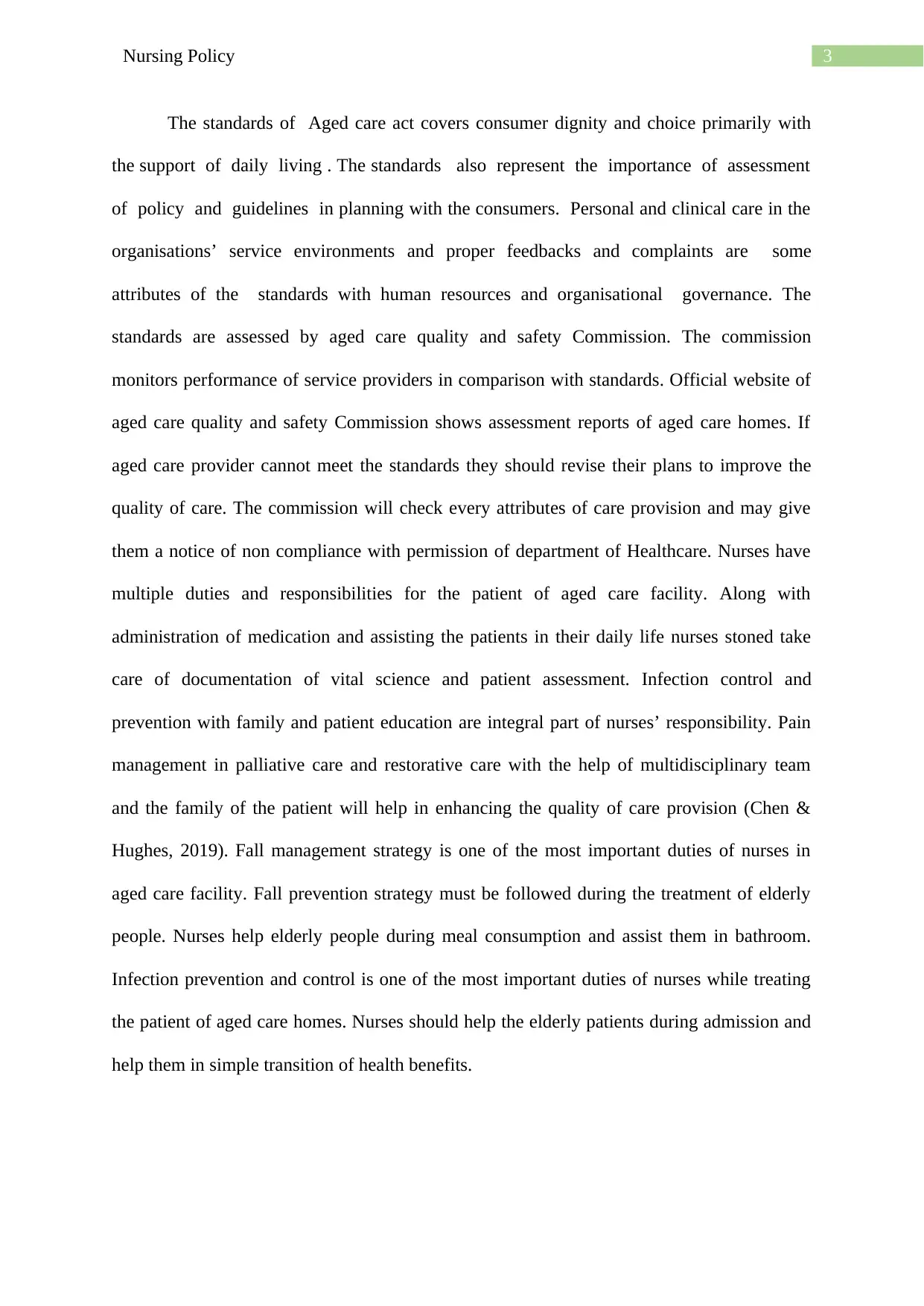
3Nursing Policy
The standards of Aged care act covers consumer dignity and choice primarily with
the support of daily living . The standards also represent the importance of assessment
of policy and guidelines in planning with the consumers. Personal and clinical care in the
organisations’ service environments and proper feedbacks and complaints are some
attributes of the standards with human resources and organisational governance. The
standards are assessed by aged care quality and safety Commission. The commission
monitors performance of service providers in comparison with standards. Official website of
aged care quality and safety Commission shows assessment reports of aged care homes. If
aged care provider cannot meet the standards they should revise their plans to improve the
quality of care. The commission will check every attributes of care provision and may give
them a notice of non compliance with permission of department of Healthcare. Nurses have
multiple duties and responsibilities for the patient of aged care facility. Along with
administration of medication and assisting the patients in their daily life nurses stoned take
care of documentation of vital science and patient assessment. Infection control and
prevention with family and patient education are integral part of nurses’ responsibility. Pain
management in palliative care and restorative care with the help of multidisciplinary team
and the family of the patient will help in enhancing the quality of care provision (Chen &
Hughes, 2019). Fall management strategy is one of the most important duties of nurses in
aged care facility. Fall prevention strategy must be followed during the treatment of elderly
people. Nurses help elderly people during meal consumption and assist them in bathroom.
Infection prevention and control is one of the most important duties of nurses while treating
the patient of aged care homes. Nurses should help the elderly patients during admission and
help them in simple transition of health benefits.
The standards of Aged care act covers consumer dignity and choice primarily with
the support of daily living . The standards also represent the importance of assessment
of policy and guidelines in planning with the consumers. Personal and clinical care in the
organisations’ service environments and proper feedbacks and complaints are some
attributes of the standards with human resources and organisational governance. The
standards are assessed by aged care quality and safety Commission. The commission
monitors performance of service providers in comparison with standards. Official website of
aged care quality and safety Commission shows assessment reports of aged care homes. If
aged care provider cannot meet the standards they should revise their plans to improve the
quality of care. The commission will check every attributes of care provision and may give
them a notice of non compliance with permission of department of Healthcare. Nurses have
multiple duties and responsibilities for the patient of aged care facility. Along with
administration of medication and assisting the patients in their daily life nurses stoned take
care of documentation of vital science and patient assessment. Infection control and
prevention with family and patient education are integral part of nurses’ responsibility. Pain
management in palliative care and restorative care with the help of multidisciplinary team
and the family of the patient will help in enhancing the quality of care provision (Chen &
Hughes, 2019). Fall management strategy is one of the most important duties of nurses in
aged care facility. Fall prevention strategy must be followed during the treatment of elderly
people. Nurses help elderly people during meal consumption and assist them in bathroom.
Infection prevention and control is one of the most important duties of nurses while treating
the patient of aged care homes. Nurses should help the elderly patients during admission and
help them in simple transition of health benefits.
Paraphrase This Document
Need a fresh take? Get an instant paraphrase of this document with our AI Paraphraser
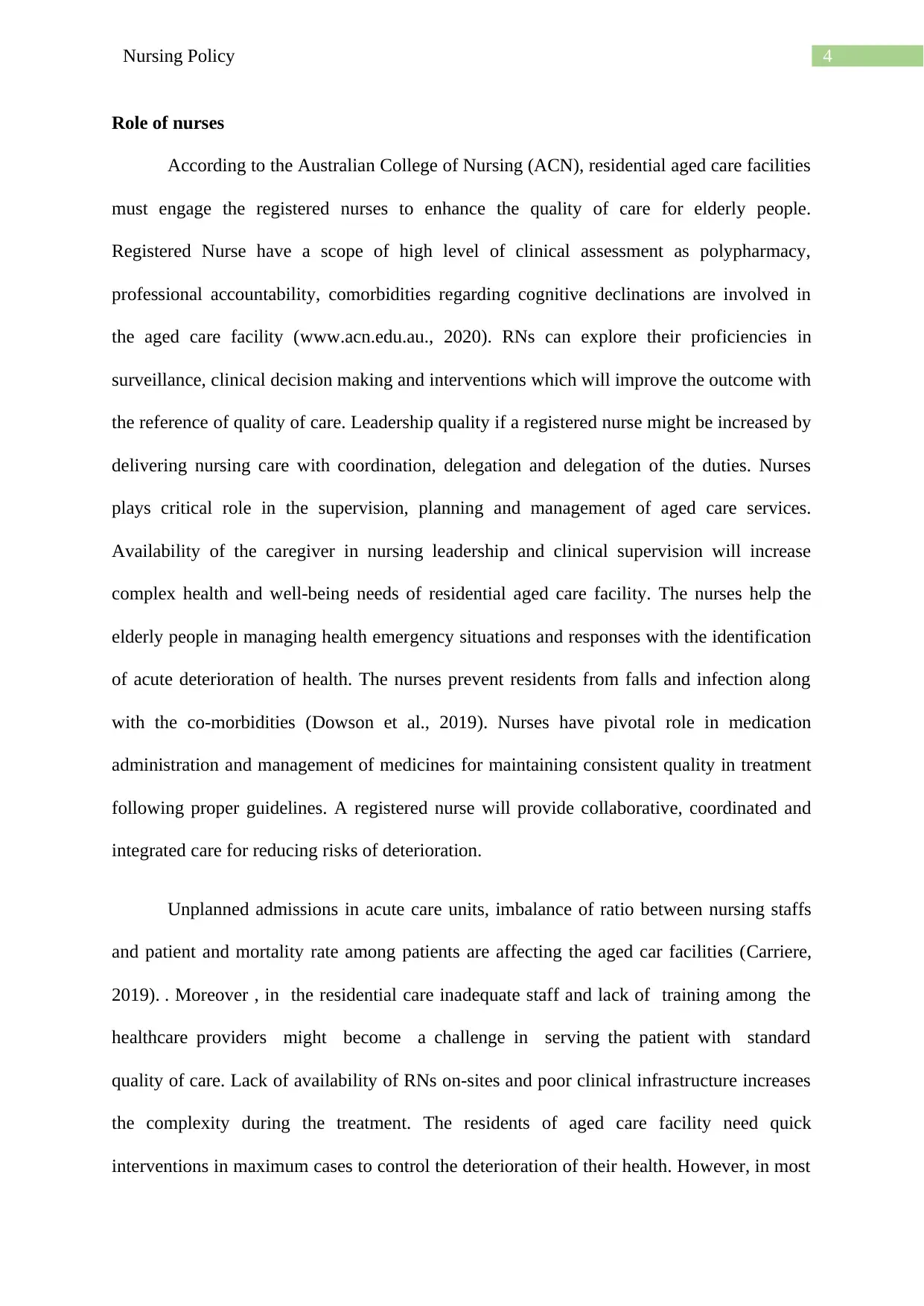
4Nursing Policy
Role of nurses
According to the Australian College of Nursing (ACN), residential aged care facilities
must engage the registered nurses to enhance the quality of care for elderly people.
Registered Nurse have a scope of high level of clinical assessment as polypharmacy,
professional accountability, comorbidities regarding cognitive declinations are involved in
the aged care facility (www.acn.edu.au., 2020). RNs can explore their proficiencies in
surveillance, clinical decision making and interventions which will improve the outcome with
the reference of quality of care. Leadership quality if a registered nurse might be increased by
delivering nursing care with coordination, delegation and delegation of the duties. Nurses
plays critical role in the supervision, planning and management of aged care services.
Availability of the caregiver in nursing leadership and clinical supervision will increase
complex health and well-being needs of residential aged care facility. The nurses help the
elderly people in managing health emergency situations and responses with the identification
of acute deterioration of health. The nurses prevent residents from falls and infection along
with the co-morbidities (Dowson et al., 2019). Nurses have pivotal role in medication
administration and management of medicines for maintaining consistent quality in treatment
following proper guidelines. A registered nurse will provide collaborative, coordinated and
integrated care for reducing risks of deterioration.
Unplanned admissions in acute care units, imbalance of ratio between nursing staffs
and patient and mortality rate among patients are affecting the aged car facilities (Carriere,
2019). . Moreover , in the residential care inadequate staff and lack of training among the
healthcare providers might become a challenge in serving the patient with standard
quality of care. Lack of availability of RNs on-sites and poor clinical infrastructure increases
the complexity during the treatment. The residents of aged care facility need quick
interventions in maximum cases to control the deterioration of their health. However, in most
Role of nurses
According to the Australian College of Nursing (ACN), residential aged care facilities
must engage the registered nurses to enhance the quality of care for elderly people.
Registered Nurse have a scope of high level of clinical assessment as polypharmacy,
professional accountability, comorbidities regarding cognitive declinations are involved in
the aged care facility (www.acn.edu.au., 2020). RNs can explore their proficiencies in
surveillance, clinical decision making and interventions which will improve the outcome with
the reference of quality of care. Leadership quality if a registered nurse might be increased by
delivering nursing care with coordination, delegation and delegation of the duties. Nurses
plays critical role in the supervision, planning and management of aged care services.
Availability of the caregiver in nursing leadership and clinical supervision will increase
complex health and well-being needs of residential aged care facility. The nurses help the
elderly people in managing health emergency situations and responses with the identification
of acute deterioration of health. The nurses prevent residents from falls and infection along
with the co-morbidities (Dowson et al., 2019). Nurses have pivotal role in medication
administration and management of medicines for maintaining consistent quality in treatment
following proper guidelines. A registered nurse will provide collaborative, coordinated and
integrated care for reducing risks of deterioration.
Unplanned admissions in acute care units, imbalance of ratio between nursing staffs
and patient and mortality rate among patients are affecting the aged car facilities (Carriere,
2019). . Moreover , in the residential care inadequate staff and lack of training among the
healthcare providers might become a challenge in serving the patient with standard
quality of care. Lack of availability of RNs on-sites and poor clinical infrastructure increases
the complexity during the treatment. The residents of aged care facility need quick
interventions in maximum cases to control the deterioration of their health. However, in most
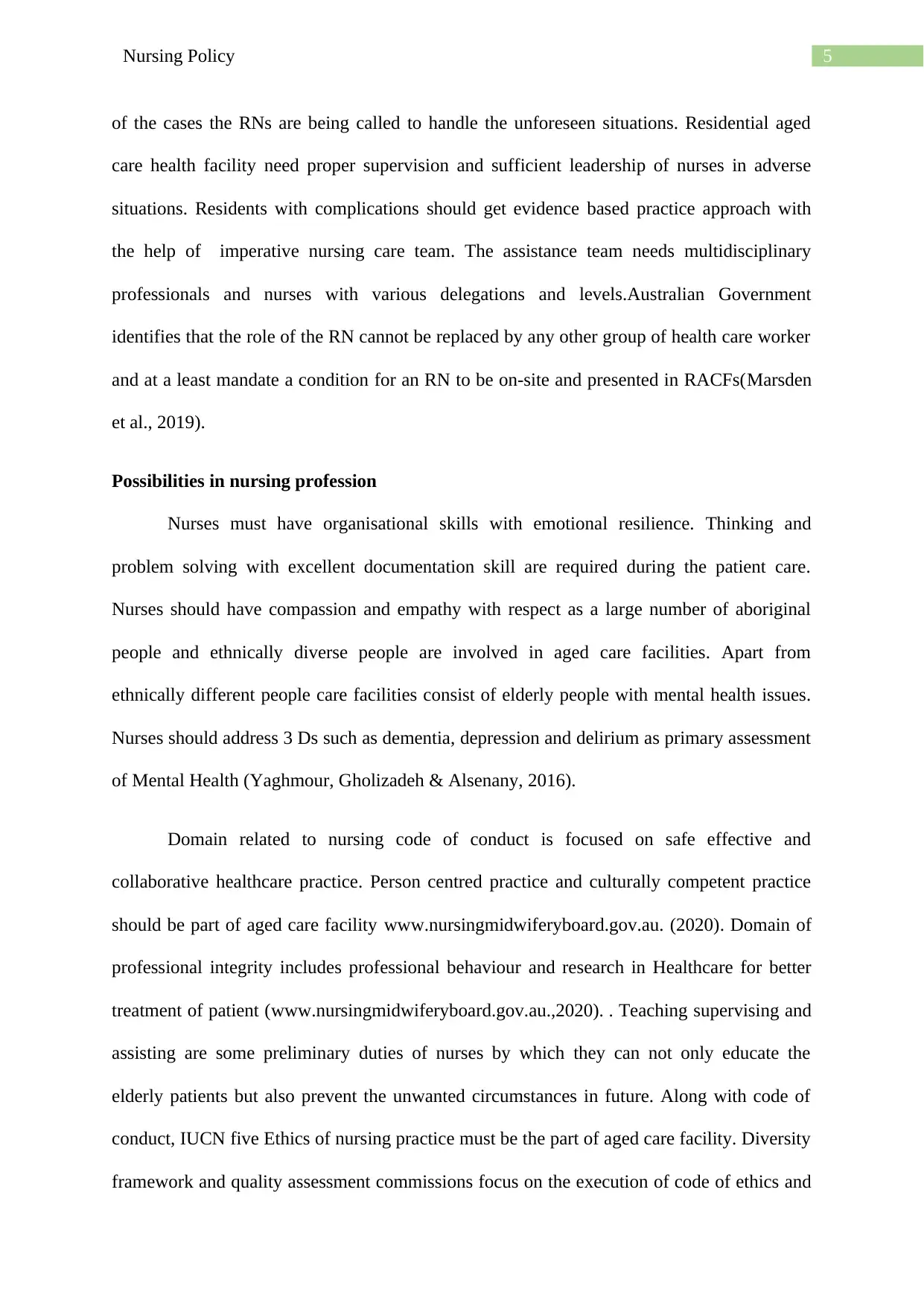
5Nursing Policy
of the cases the RNs are being called to handle the unforeseen situations. Residential aged
care health facility need proper supervision and sufficient leadership of nurses in adverse
situations. Residents with complications should get evidence based practice approach with
the help of imperative nursing care team. The assistance team needs multidisciplinary
professionals and nurses with various delegations and levels.Australian Government
identifies that the role of the RN cannot be replaced by any other group of health care worker
and at a least mandate a condition for an RN to be on-site and presented in RACFs(Marsden
et al., 2019).
Possibilities in nursing profession
Nurses must have organisational skills with emotional resilience. Thinking and
problem solving with excellent documentation skill are required during the patient care.
Nurses should have compassion and empathy with respect as a large number of aboriginal
people and ethnically diverse people are involved in aged care facilities. Apart from
ethnically different people care facilities consist of elderly people with mental health issues.
Nurses should address 3 Ds such as dementia, depression and delirium as primary assessment
of Mental Health (Yaghmour, Gholizadeh & Alsenany, 2016).
Domain related to nursing code of conduct is focused on safe effective and
collaborative healthcare practice. Person centred practice and culturally competent practice
should be part of aged care facility www.nursingmidwiferyboard.gov.au. (2020). Domain of
professional integrity includes professional behaviour and research in Healthcare for better
treatment of patient (www.nursingmidwiferyboard.gov.au.,2020). . Teaching supervising and
assisting are some preliminary duties of nurses by which they can not only educate the
elderly patients but also prevent the unwanted circumstances in future. Along with code of
conduct, IUCN five Ethics of nursing practice must be the part of aged care facility. Diversity
framework and quality assessment commissions focus on the execution of code of ethics and
of the cases the RNs are being called to handle the unforeseen situations. Residential aged
care health facility need proper supervision and sufficient leadership of nurses in adverse
situations. Residents with complications should get evidence based practice approach with
the help of imperative nursing care team. The assistance team needs multidisciplinary
professionals and nurses with various delegations and levels.Australian Government
identifies that the role of the RN cannot be replaced by any other group of health care worker
and at a least mandate a condition for an RN to be on-site and presented in RACFs(Marsden
et al., 2019).
Possibilities in nursing profession
Nurses must have organisational skills with emotional resilience. Thinking and
problem solving with excellent documentation skill are required during the patient care.
Nurses should have compassion and empathy with respect as a large number of aboriginal
people and ethnically diverse people are involved in aged care facilities. Apart from
ethnically different people care facilities consist of elderly people with mental health issues.
Nurses should address 3 Ds such as dementia, depression and delirium as primary assessment
of Mental Health (Yaghmour, Gholizadeh & Alsenany, 2016).
Domain related to nursing code of conduct is focused on safe effective and
collaborative healthcare practice. Person centred practice and culturally competent practice
should be part of aged care facility www.nursingmidwiferyboard.gov.au. (2020). Domain of
professional integrity includes professional behaviour and research in Healthcare for better
treatment of patient (www.nursingmidwiferyboard.gov.au.,2020). . Teaching supervising and
assisting are some preliminary duties of nurses by which they can not only educate the
elderly patients but also prevent the unwanted circumstances in future. Along with code of
conduct, IUCN five Ethics of nursing practice must be the part of aged care facility. Diversity
framework and quality assessment commissions focus on the execution of code of ethics and
⊘ This is a preview!⊘
Do you want full access?
Subscribe today to unlock all pages.

Trusted by 1+ million students worldwide
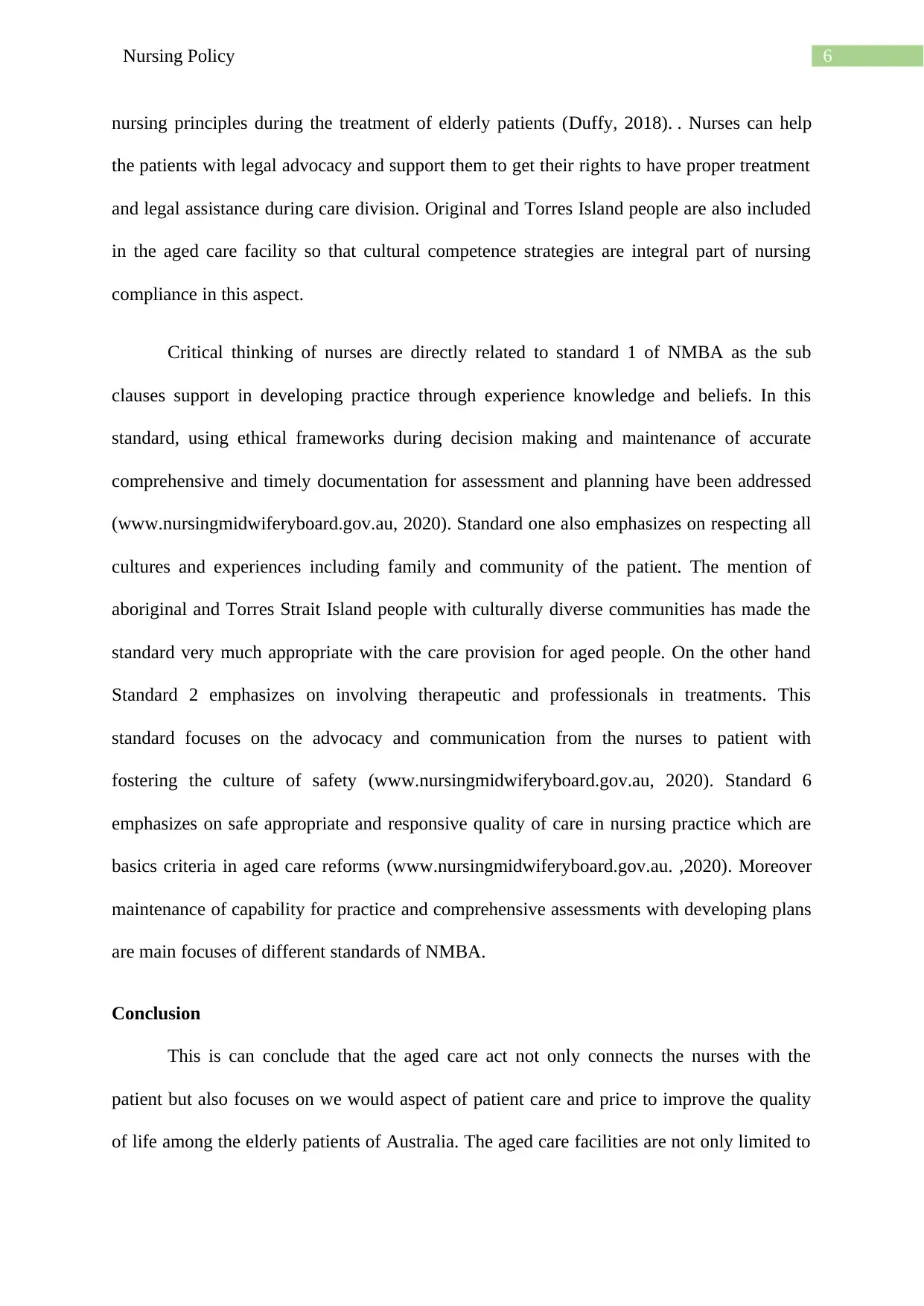
6Nursing Policy
nursing principles during the treatment of elderly patients (Duffy, 2018). . Nurses can help
the patients with legal advocacy and support them to get their rights to have proper treatment
and legal assistance during care division. Original and Torres Island people are also included
in the aged care facility so that cultural competence strategies are integral part of nursing
compliance in this aspect.
Critical thinking of nurses are directly related to standard 1 of NMBA as the sub
clauses support in developing practice through experience knowledge and beliefs. In this
standard, using ethical frameworks during decision making and maintenance of accurate
comprehensive and timely documentation for assessment and planning have been addressed
(www.nursingmidwiferyboard.gov.au, 2020). Standard one also emphasizes on respecting all
cultures and experiences including family and community of the patient. The mention of
aboriginal and Torres Strait Island people with culturally diverse communities has made the
standard very much appropriate with the care provision for aged people. On the other hand
Standard 2 emphasizes on involving therapeutic and professionals in treatments. This
standard focuses on the advocacy and communication from the nurses to patient with
fostering the culture of safety (www.nursingmidwiferyboard.gov.au, 2020). Standard 6
emphasizes on safe appropriate and responsive quality of care in nursing practice which are
basics criteria in aged care reforms (www.nursingmidwiferyboard.gov.au. ,2020). Moreover
maintenance of capability for practice and comprehensive assessments with developing plans
are main focuses of different standards of NMBA.
Conclusion
This is can conclude that the aged care act not only connects the nurses with the
patient but also focuses on we would aspect of patient care and price to improve the quality
of life among the elderly patients of Australia. The aged care facilities are not only limited to
nursing principles during the treatment of elderly patients (Duffy, 2018). . Nurses can help
the patients with legal advocacy and support them to get their rights to have proper treatment
and legal assistance during care division. Original and Torres Island people are also included
in the aged care facility so that cultural competence strategies are integral part of nursing
compliance in this aspect.
Critical thinking of nurses are directly related to standard 1 of NMBA as the sub
clauses support in developing practice through experience knowledge and beliefs. In this
standard, using ethical frameworks during decision making and maintenance of accurate
comprehensive and timely documentation for assessment and planning have been addressed
(www.nursingmidwiferyboard.gov.au, 2020). Standard one also emphasizes on respecting all
cultures and experiences including family and community of the patient. The mention of
aboriginal and Torres Strait Island people with culturally diverse communities has made the
standard very much appropriate with the care provision for aged people. On the other hand
Standard 2 emphasizes on involving therapeutic and professionals in treatments. This
standard focuses on the advocacy and communication from the nurses to patient with
fostering the culture of safety (www.nursingmidwiferyboard.gov.au, 2020). Standard 6
emphasizes on safe appropriate and responsive quality of care in nursing practice which are
basics criteria in aged care reforms (www.nursingmidwiferyboard.gov.au. ,2020). Moreover
maintenance of capability for practice and comprehensive assessments with developing plans
are main focuses of different standards of NMBA.
Conclusion
This is can conclude that the aged care act not only connects the nurses with the
patient but also focuses on we would aspect of patient care and price to improve the quality
of life among the elderly patients of Australia. The aged care facilities are not only limited to
Paraphrase This Document
Need a fresh take? Get an instant paraphrase of this document with our AI Paraphraser

7Nursing Policy
some mandates but also code elated with different standards and professional codes of
Australian health the health department full star the role of nurses and Healthcare
professionals is the integral part of any Health Care reforms so aged care facility is not an
exception. Has interview the nursing roles with the nursing standards and codes of conduct to
portray comprehensive analysis for the aged care act.
some mandates but also code elated with different standards and professional codes of
Australian health the health department full star the role of nurses and Healthcare
professionals is the integral part of any Health Care reforms so aged care facility is not an
exception. Has interview the nursing roles with the nursing standards and codes of conduct to
portray comprehensive analysis for the aged care act.
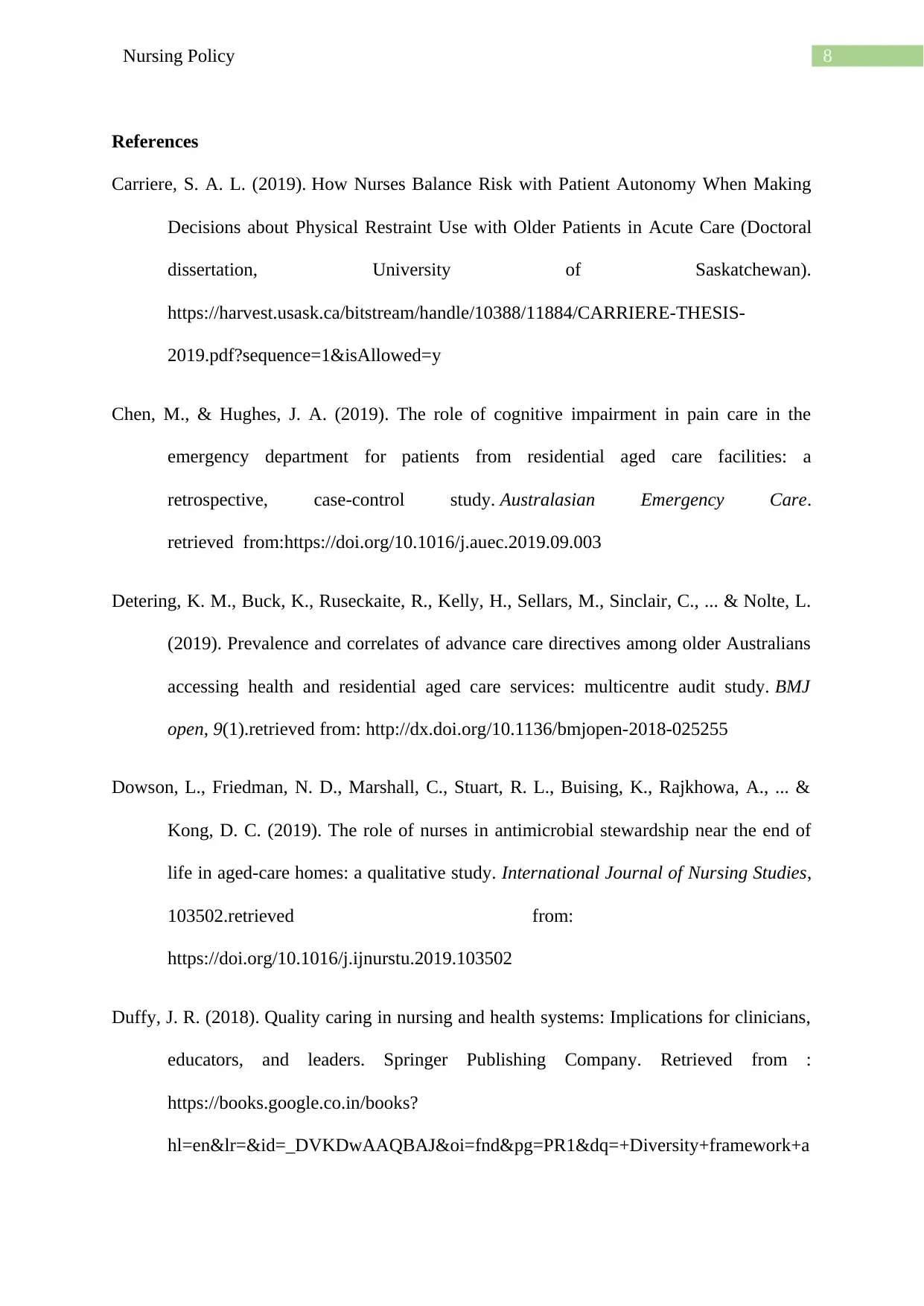
8Nursing Policy
References
Carriere, S. A. L. (2019). How Nurses Balance Risk with Patient Autonomy When Making
Decisions about Physical Restraint Use with Older Patients in Acute Care (Doctoral
dissertation, University of Saskatchewan).
https://harvest.usask.ca/bitstream/handle/10388/11884/CARRIERE-THESIS-
2019.pdf?sequence=1&isAllowed=y
Chen, M., & Hughes, J. A. (2019). The role of cognitive impairment in pain care in the
emergency department for patients from residential aged care facilities: a
retrospective, case-control study. Australasian Emergency Care.
retrieved from:https://doi.org/10.1016/j.auec.2019.09.003
Detering, K. M., Buck, K., Ruseckaite, R., Kelly, H., Sellars, M., Sinclair, C., ... & Nolte, L.
(2019). Prevalence and correlates of advance care directives among older Australians
accessing health and residential aged care services: multicentre audit study. BMJ
open, 9(1).retrieved from: http://dx.doi.org/10.1136/bmjopen-2018-025255
Dowson, L., Friedman, N. D., Marshall, C., Stuart, R. L., Buising, K., Rajkhowa, A., ... &
Kong, D. C. (2019). The role of nurses in antimicrobial stewardship near the end of
life in aged-care homes: a qualitative study. International Journal of Nursing Studies,
103502.retrieved from:
https://doi.org/10.1016/j.ijnurstu.2019.103502
Duffy, J. R. (2018). Quality caring in nursing and health systems: Implications for clinicians,
educators, and leaders. Springer Publishing Company. Retrieved from :
https://books.google.co.in/books?
hl=en&lr=&id=_DVKDwAAQBAJ&oi=fnd&pg=PR1&dq=+Diversity+framework+a
References
Carriere, S. A. L. (2019). How Nurses Balance Risk with Patient Autonomy When Making
Decisions about Physical Restraint Use with Older Patients in Acute Care (Doctoral
dissertation, University of Saskatchewan).
https://harvest.usask.ca/bitstream/handle/10388/11884/CARRIERE-THESIS-
2019.pdf?sequence=1&isAllowed=y
Chen, M., & Hughes, J. A. (2019). The role of cognitive impairment in pain care in the
emergency department for patients from residential aged care facilities: a
retrospective, case-control study. Australasian Emergency Care.
retrieved from:https://doi.org/10.1016/j.auec.2019.09.003
Detering, K. M., Buck, K., Ruseckaite, R., Kelly, H., Sellars, M., Sinclair, C., ... & Nolte, L.
(2019). Prevalence and correlates of advance care directives among older Australians
accessing health and residential aged care services: multicentre audit study. BMJ
open, 9(1).retrieved from: http://dx.doi.org/10.1136/bmjopen-2018-025255
Dowson, L., Friedman, N. D., Marshall, C., Stuart, R. L., Buising, K., Rajkhowa, A., ... &
Kong, D. C. (2019). The role of nurses in antimicrobial stewardship near the end of
life in aged-care homes: a qualitative study. International Journal of Nursing Studies,
103502.retrieved from:
https://doi.org/10.1016/j.ijnurstu.2019.103502
Duffy, J. R. (2018). Quality caring in nursing and health systems: Implications for clinicians,
educators, and leaders. Springer Publishing Company. Retrieved from :
https://books.google.co.in/books?
hl=en&lr=&id=_DVKDwAAQBAJ&oi=fnd&pg=PR1&dq=+Diversity+framework+a
⊘ This is a preview!⊘
Do you want full access?
Subscribe today to unlock all pages.

Trusted by 1+ million students worldwide
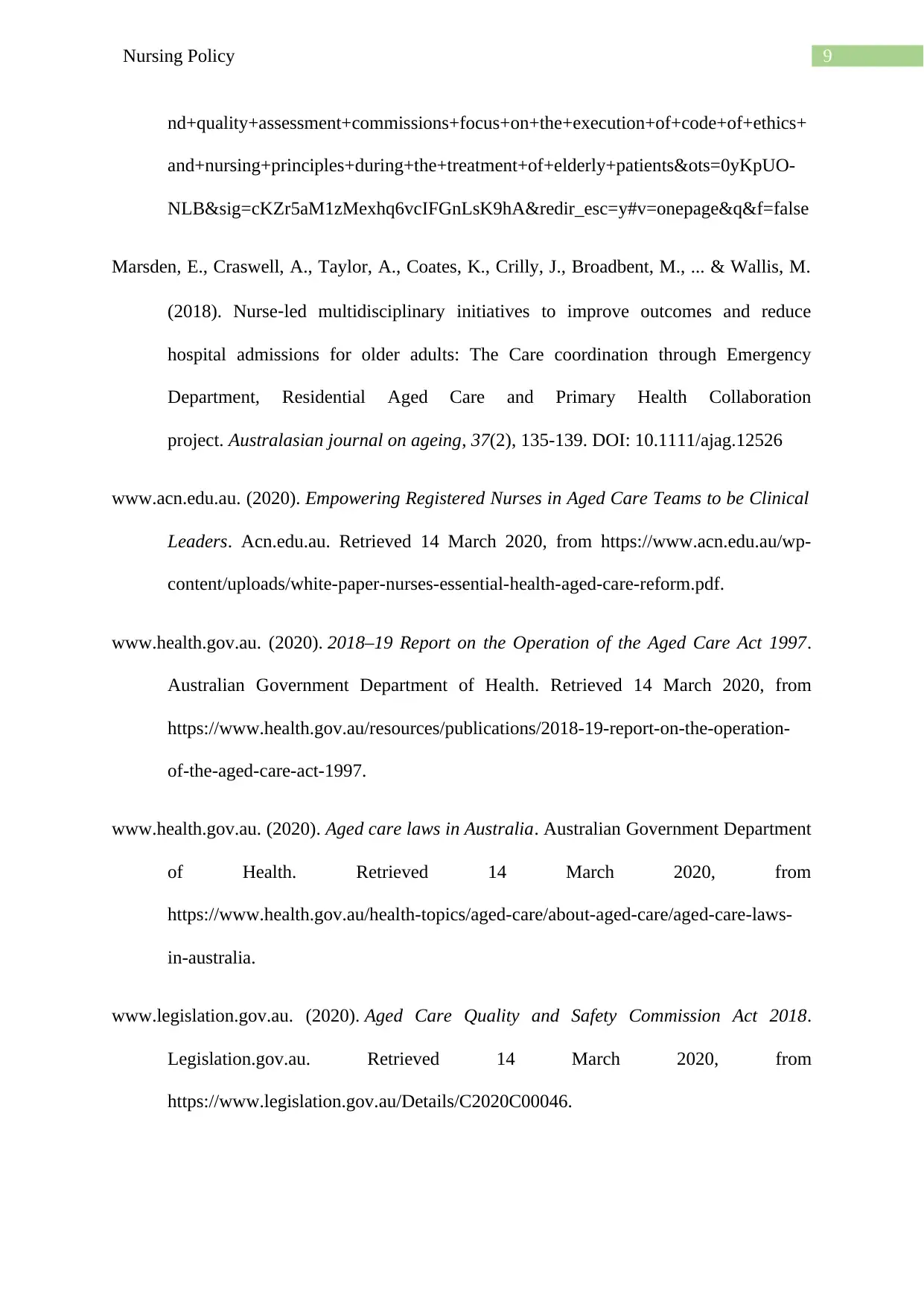
9Nursing Policy
nd+quality+assessment+commissions+focus+on+the+execution+of+code+of+ethics+
and+nursing+principles+during+the+treatment+of+elderly+patients&ots=0yKpUO-
NLB&sig=cKZr5aM1zMexhq6vcIFGnLsK9hA&redir_esc=y#v=onepage&q&f=false
Marsden, E., Craswell, A., Taylor, A., Coates, K., Crilly, J., Broadbent, M., ... & Wallis, M.
(2018). Nurse‐led multidisciplinary initiatives to improve outcomes and reduce
hospital admissions for older adults: The Care coordination through Emergency
Department, Residential Aged Care and Primary Health Collaboration
project. Australasian journal on ageing, 37(2), 135-139. DOI: 10.1111/ajag.12526
www.acn.edu.au. (2020). Empowering Registered Nurses in Aged Care Teams to be Clinical
Leaders. Acn.edu.au. Retrieved 14 March 2020, from https://www.acn.edu.au/wp-
content/uploads/white-paper-nurses-essential-health-aged-care-reform.pdf.
www.health.gov.au. (2020). 2018–19 Report on the Operation of the Aged Care Act 1997.
Australian Government Department of Health. Retrieved 14 March 2020, from
https://www.health.gov.au/resources/publications/2018-19-report-on-the-operation-
of-the-aged-care-act-1997.
www.health.gov.au. (2020). Aged care laws in Australia. Australian Government Department
of Health. Retrieved 14 March 2020, from
https://www.health.gov.au/health-topics/aged-care/about-aged-care/aged-care-laws-
in-australia.
www.legislation.gov.au. (2020). Aged Care Quality and Safety Commission Act 2018.
Legislation.gov.au. Retrieved 14 March 2020, from
https://www.legislation.gov.au/Details/C2020C00046.
nd+quality+assessment+commissions+focus+on+the+execution+of+code+of+ethics+
and+nursing+principles+during+the+treatment+of+elderly+patients&ots=0yKpUO-
NLB&sig=cKZr5aM1zMexhq6vcIFGnLsK9hA&redir_esc=y#v=onepage&q&f=false
Marsden, E., Craswell, A., Taylor, A., Coates, K., Crilly, J., Broadbent, M., ... & Wallis, M.
(2018). Nurse‐led multidisciplinary initiatives to improve outcomes and reduce
hospital admissions for older adults: The Care coordination through Emergency
Department, Residential Aged Care and Primary Health Collaboration
project. Australasian journal on ageing, 37(2), 135-139. DOI: 10.1111/ajag.12526
www.acn.edu.au. (2020). Empowering Registered Nurses in Aged Care Teams to be Clinical
Leaders. Acn.edu.au. Retrieved 14 March 2020, from https://www.acn.edu.au/wp-
content/uploads/white-paper-nurses-essential-health-aged-care-reform.pdf.
www.health.gov.au. (2020). 2018–19 Report on the Operation of the Aged Care Act 1997.
Australian Government Department of Health. Retrieved 14 March 2020, from
https://www.health.gov.au/resources/publications/2018-19-report-on-the-operation-
of-the-aged-care-act-1997.
www.health.gov.au. (2020). Aged care laws in Australia. Australian Government Department
of Health. Retrieved 14 March 2020, from
https://www.health.gov.au/health-topics/aged-care/about-aged-care/aged-care-laws-
in-australia.
www.legislation.gov.au. (2020). Aged Care Quality and Safety Commission Act 2018.
Legislation.gov.au. Retrieved 14 March 2020, from
https://www.legislation.gov.au/Details/C2020C00046.
Paraphrase This Document
Need a fresh take? Get an instant paraphrase of this document with our AI Paraphraser
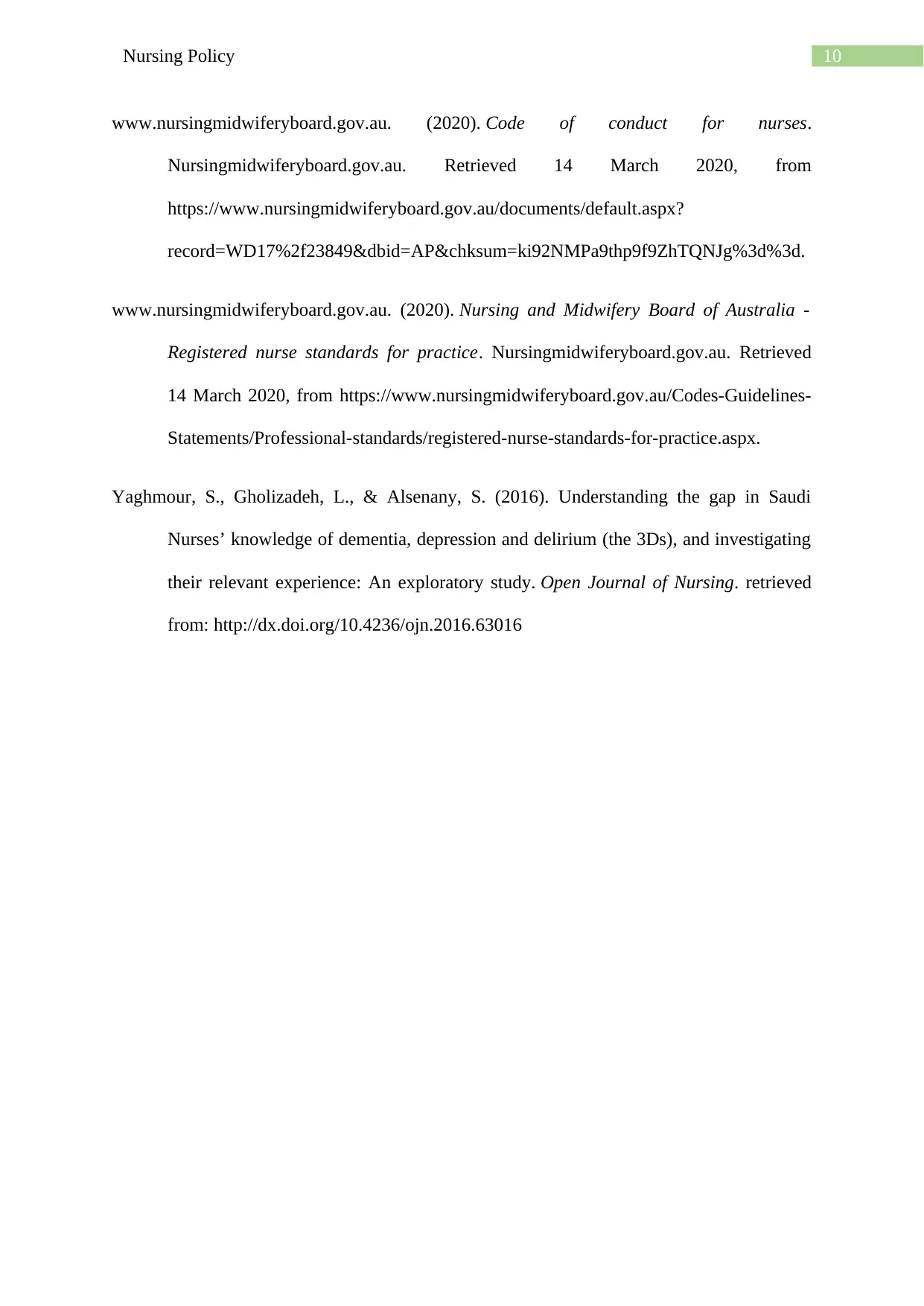
10Nursing Policy
www.nursingmidwiferyboard.gov.au. (2020). Code of conduct for nurses.
Nursingmidwiferyboard.gov.au. Retrieved 14 March 2020, from
https://www.nursingmidwiferyboard.gov.au/documents/default.aspx?
record=WD17%2f23849&dbid=AP&chksum=ki92NMPa9thp9f9ZhTQNJg%3d%3d.
www.nursingmidwiferyboard.gov.au. (2020). Nursing and Midwifery Board of Australia -
Registered nurse standards for practice. Nursingmidwiferyboard.gov.au. Retrieved
14 March 2020, from https://www.nursingmidwiferyboard.gov.au/Codes-Guidelines-
Statements/Professional-standards/registered-nurse-standards-for-practice.aspx.
Yaghmour, S., Gholizadeh, L., & Alsenany, S. (2016). Understanding the gap in Saudi
Nurses’ knowledge of dementia, depression and delirium (the 3Ds), and investigating
their relevant experience: An exploratory study. Open Journal of Nursing. retrieved
from: http://dx.doi.org/10.4236/ojn.2016.63016
www.nursingmidwiferyboard.gov.au. (2020). Code of conduct for nurses.
Nursingmidwiferyboard.gov.au. Retrieved 14 March 2020, from
https://www.nursingmidwiferyboard.gov.au/documents/default.aspx?
record=WD17%2f23849&dbid=AP&chksum=ki92NMPa9thp9f9ZhTQNJg%3d%3d.
www.nursingmidwiferyboard.gov.au. (2020). Nursing and Midwifery Board of Australia -
Registered nurse standards for practice. Nursingmidwiferyboard.gov.au. Retrieved
14 March 2020, from https://www.nursingmidwiferyboard.gov.au/Codes-Guidelines-
Statements/Professional-standards/registered-nurse-standards-for-practice.aspx.
Yaghmour, S., Gholizadeh, L., & Alsenany, S. (2016). Understanding the gap in Saudi
Nurses’ knowledge of dementia, depression and delirium (the 3Ds), and investigating
their relevant experience: An exploratory study. Open Journal of Nursing. retrieved
from: http://dx.doi.org/10.4236/ojn.2016.63016
1 out of 11
Related Documents
Your All-in-One AI-Powered Toolkit for Academic Success.
+13062052269
info@desklib.com
Available 24*7 on WhatsApp / Email
![[object Object]](/_next/static/media/star-bottom.7253800d.svg)
Unlock your academic potential
Copyright © 2020–2026 A2Z Services. All Rights Reserved. Developed and managed by ZUCOL.





